The Most Hated Stock Market Rally in Wall Street History
Stock-Markets / Financial Markets 2009 Oct 10, 2009 - 05:06 AM GMT The rebound in U.S. consumer spending, driven by government stimulus, will wane as the unemployment rate surpasses 10 percent, a survey of economists showed.
The rebound in U.S. consumer spending, driven by government stimulus, will wane as the unemployment rate surpasses 10 percent, a survey of economists showed.
“You just can’t see a lot of strength on the consumer side given how battered income is from job losses and weak hourly wage growth,” said David Greenlaw, chief fixed-income economist at Morgan Stanley & Co. in New York. “We’ve got a gradual recovery in the overall economy, but it’s not vigorous enough to knock down the unemployment rate by much.”
An extended period of low growth ahead?
White House economic adviser Lawrence Summers rejected the notion that the U.S. faces an extended period of below-average growth and high unemployment in the wake of the worst recession since the 1930s.
“I would be very reluctant to accept the idea that the American economy no longer has the potential to grow rapidly,” Summers told a forum in New York yesterday organized by Bloomberg LP, the parent of Bloomberg News. “The American people have not become less capable of entrepreneurship. They have not become less dedicated to hard work, and the productive potential of this economy has not declined.”
Carl Icahn Discusses A Schizophrenic Market
"I think that you have to be cautious. It's on a precipice right now and it could really go either way."
The Most Hated Rally in Wall Street History
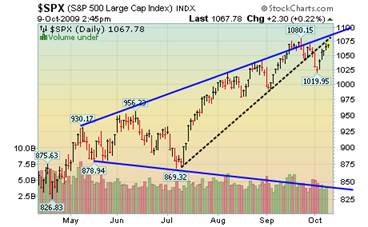 --Barry Ritholtz, market strategist, has some commentary on this rally. Among his insights are these: “Most bull moves do not end when they are hated, they come to a halt and reverse when they become over-owned and over-loved.” And, “What we have been experiencing since that low has NOT been an anticipation of earnings improvements, or a V shaped recovery. To be blunt, it is little more than mean reversion, as the aberrational credit panic sell off gets unwound.” In other words, things can get difficult here.
--Barry Ritholtz, market strategist, has some commentary on this rally. Among his insights are these: “Most bull moves do not end when they are hated, they come to a halt and reverse when they become over-owned and over-loved.” And, “What we have been experiencing since that low has NOT been an anticipation of earnings improvements, or a V shaped recovery. To be blunt, it is little more than mean reversion, as the aberrational credit panic sell off gets unwound.” In other words, things can get difficult here.
Treasuries reject a potential head and shoulders neckline.
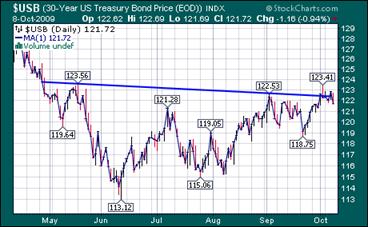 -- Treasuries fell with two-year notes headed for their first weekly loss since September, as Federal Reserve Chairman Ben S. Bernanke said the bank is ready to tighten monetary policy once the economic outlook improves. Thirty-year bonds are set for their biggest weekly decline since August after yesterday’s $12 billion auction of 30-year bonds drew weaker-than-average demand and a Labor Department report showed the number of Americans filing first-time jobless claims fell last week to the lowest level since January.
-- Treasuries fell with two-year notes headed for their first weekly loss since September, as Federal Reserve Chairman Ben S. Bernanke said the bank is ready to tighten monetary policy once the economic outlook improves. Thirty-year bonds are set for their biggest weekly decline since August after yesterday’s $12 billion auction of 30-year bonds drew weaker-than-average demand and a Labor Department report showed the number of Americans filing first-time jobless claims fell last week to the lowest level since January.
Gold rally getting stretched?
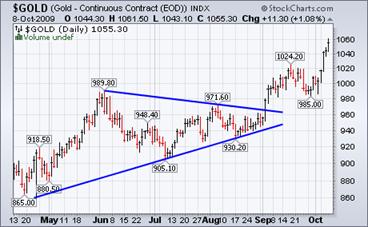 --Gold prices dropped, paring the biggest weekly advance since April, as a stronger dollar cut demand and some investors sold the metal to lock in gains from its climb to a record.
--Gold prices dropped, paring the biggest weekly advance since April, as a stronger dollar cut demand and some investors sold the metal to lock in gains from its climb to a record.
“Everybody is so bearish on the dollar and so bullish of gold, the market just had to turn,” said Matt Zeman, a LaSalle Futures Group metals trader in Chicago.
Will the Nikkei continue its rally?
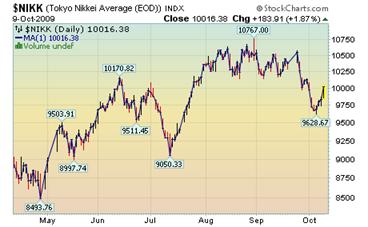 - Japanese stocks gained for a fourth day as rising prices of oil and metals boosted commodities producers. Shares got a boost as the dollar strengthened after U.S. Federal Reserve Chairman Ben S. Bernanke said the central bank will be prepared to tighten monetary policy when the outlook for the economy “has improved sufficiently.”
- Japanese stocks gained for a fourth day as rising prices of oil and metals boosted commodities producers. Shares got a boost as the dollar strengthened after U.S. Federal Reserve Chairman Ben S. Bernanke said the central bank will be prepared to tighten monetary policy when the outlook for the economy “has improved sufficiently.”
China’s decline eases.
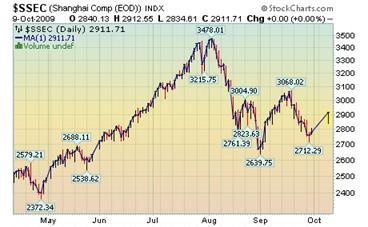 -- The Shanghai index jumped, driving the benchmark index to its biggest gain in five weeks, as the nation’s markets opened after an eight-day holiday amid evidence the global economy is recovering. The Shanghai index fell 6.1 percent in the third quarter, the worst performer among the largest emerging markets, on concern a lending slowdown will derail the economy. Equities in the benchmark gauge trade at 32.2 times its companies’ reported profit, down from this year’s peak of 39.
-- The Shanghai index jumped, driving the benchmark index to its biggest gain in five weeks, as the nation’s markets opened after an eight-day holiday amid evidence the global economy is recovering. The Shanghai index fell 6.1 percent in the third quarter, the worst performer among the largest emerging markets, on concern a lending slowdown will derail the economy. Equities in the benchmark gauge trade at 32.2 times its companies’ reported profit, down from this year’s peak of 39.
The dollar bounces from the bottom.
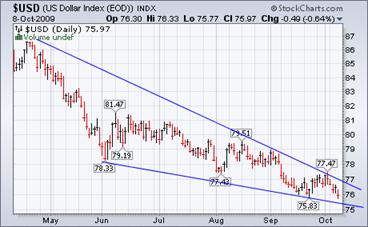 The dollar rose against the yen for the first time in a week on speculation the Bank of Japan will trail other central banks in increasing interest rates as the global recession comes to an end. The Fed “could, shockingly, go early,” said Richard Franulovich, a senior currency strategist at Westpac Banking Corp. in New York. “If they do, that’s great news for the dollar. The Fed’s been unfairly criticized as a source of dollar weakness.”
The dollar rose against the yen for the first time in a week on speculation the Bank of Japan will trail other central banks in increasing interest rates as the global recession comes to an end. The Fed “could, shockingly, go early,” said Richard Franulovich, a senior currency strategist at Westpac Banking Corp. in New York. “If they do, that’s great news for the dollar. The Fed’s been unfairly criticized as a source of dollar weakness.”
Housing foreclosures choke off recovery.
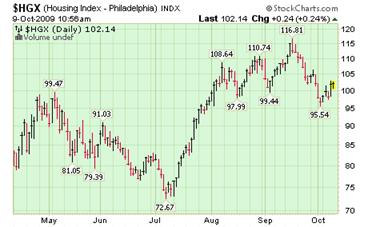 -- Every 13 seconds in America, there is another foreclosure filing. That's the rhythm of a crisis that threatens to choke off hopes for a recovery in the U.S. housing market as it destroys hundreds of billions of dollars in property values a year. There are more than 6,600 home foreclosure filings per day, according to the Center for Responsible Lending, a nonpartisan watchdog group based in Durham, North Carolina. With nearly two million already this year, the flood of foreclosures shows no sign of abating any time soon.
-- Every 13 seconds in America, there is another foreclosure filing. That's the rhythm of a crisis that threatens to choke off hopes for a recovery in the U.S. housing market as it destroys hundreds of billions of dollars in property values a year. There are more than 6,600 home foreclosure filings per day, according to the Center for Responsible Lending, a nonpartisan watchdog group based in Durham, North Carolina. With nearly two million already this year, the flood of foreclosures shows no sign of abating any time soon.
Midwest gasoline price at $2.36 in the Midwest.
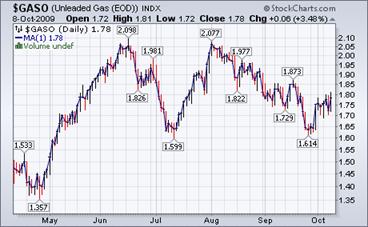 The Energy Information Administration Weekly Report suggests that, “The U.S. average price for regular gasoline dropped for the eighth consecutive week, dipping three cents to $2.47 per gallon for a cumulative reduction of 18 cents over the eight weeks. The national average was $1.02 below a year ago. Prices fell in all regions of the country with the East Coast average slipping four cents to $2.41 per gallon. The average in the Midwest declined two cents to settle at $2.36 per gallon.”
The Energy Information Administration Weekly Report suggests that, “The U.S. average price for regular gasoline dropped for the eighth consecutive week, dipping three cents to $2.47 per gallon for a cumulative reduction of 18 cents over the eight weeks. The national average was $1.02 below a year ago. Prices fell in all regions of the country with the East Coast average slipping four cents to $2.41 per gallon. The average in the Midwest declined two cents to settle at $2.36 per gallon.”
Natural gas prices unsustainable.
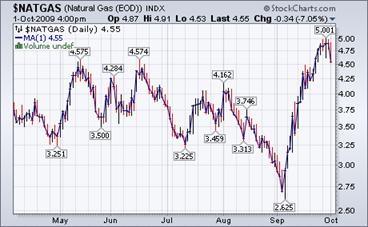 The Energy Information Agency’s Natural Gas Weekly Update reports, “The presence of colder weather helped support natural gas prices, as heating demand rose with cooler-than-normal temperatures in many areas of the country. Cooler temperatures were notable in the Rocky Mountain Region, where in some areas the mean temperature on Monday, October 5, was in the 30s. Many pricing points across the United States ended the week above $4 per MMBtu.”
The Energy Information Agency’s Natural Gas Weekly Update reports, “The presence of colder weather helped support natural gas prices, as heating demand rose with cooler-than-normal temperatures in many areas of the country. Cooler temperatures were notable in the Rocky Mountain Region, where in some areas the mean temperature on Monday, October 5, was in the 30s. Many pricing points across the United States ended the week above $4 per MMBtu.”
Is hoarding a virtue?
Most people would admit to hoarding money only with a tinge of guilt, because to be a hoarder carries with it the suggestion of being a miser — a Scrooge. And yet, every participant in an economy based on indirect exchange holds some amount of money and can be said to be hoarding it, that is, declining to spend it. Hoarding is a strategy for achieving personal goals or for dealing with economic uncertainty.
However, some economists argue that hoarding money causes recessions. In the Keynesian universe, hoarding is a great evil because it means people are stifling demand for the economy's products and services.
On October 9, 1930…
Market wrap: Stocks opened firm but then “developed sagging tendencies,” reaching new lows in many sections; volume was low most of the day. Signs of further bear pressure on leading stocks, particularly US Steel; rally attempts were weak and possibly due to short covering. Stocks drifted lower; however, “impressive resistance” developed at the lows with trading drying up and the tape halting frequently between transactions. Coppers and utilities weak. Poor sentiment was attributed to bad business news including declines in car loadings and steel production; this “offered little incentive to trading activities on the constructive side.”
The Truth About The Economy.
There is an informative video interview with Marc Faber and Nouriel Roubini on CNBC.
Our Investment Advisor Registration is on the Web
We are in the process of updating our website at www.thepracticalinvestor.com to have more information on our services. Log on and click on Advisor Registration to get more details.
If you are a client or wish to become one, please make an appointment to discuss our investment strategies by calling Connie or Tony at (517) 699-1554, ext 10 or 11. Or e-mail us at tpi@thepracticalinvestor.com .
Anthony M. Cherniawski,
President and CIO
http://www.thepracticalinvestor.com
As a State Registered Investment Advisor, The Practical Investor (TPI) manages private client investment portfolios using a proprietary investment strategy created by Chief Investment Officer Tony Cherniawski. Throughout 2000-01, when many investors felt the pain of double digit market losses, TPI successfully navigated the choppy investment waters, creating a profit for our private investment clients. With a focus on preserving assets and capitalizing on opportunities, TPI clients benefited greatly from the TPI strategies, allowing them to stay on track with their life goals
Disclaimer: The content in this article is written for educational and informational purposes only. There is no offer or recommendation to buy or sell any security and no information contained here should be interpreted or construed as investment advice. Do you own due diligence as the information in this article is the opinion of Anthony M. Cherniawski and subject to change without notice.
Anthony M. Cherniawski Archive |
© 2005-2022 http://www.MarketOracle.co.uk - The Market Oracle is a FREE Daily Financial Markets Analysis & Forecasting online publication.



